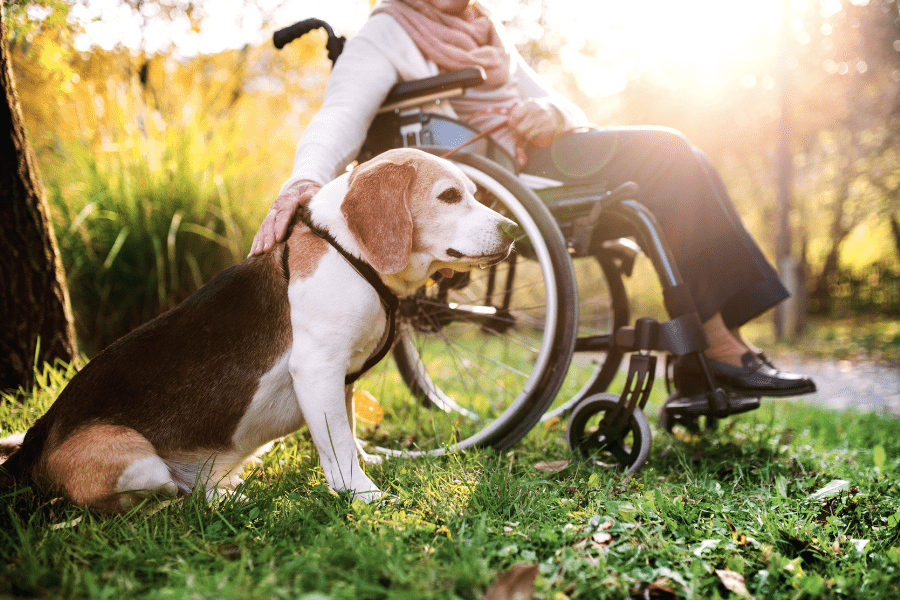
Furry and feathered friends offer companionship and a sense of fulfillment for older adults. Read on to learn which animals make the best pets for seniors and how to find resources on a budget.
Updated June 8, 2022
Looking For The Best Pets For Seniors?
Pet ownership is a wonderful way to improve older adults’ physical, emotional, and social wellbeing. Companionship is crucial for people of all ages, but it’s especially important for seniors, whose social circles often shrink over time. Depending on the type of animal you have, pet ownership encourages you to leave the house more frequently, increasing the chance of meeting other people.
Of course, animals have unique features that require different amounts of responsibility, energy, and resources. For example, some seniors may prefer an animal that can keep up with their active lifestyle. Some enjoy caring for a pet that requires more time and energy. On the other hand, some older adults may want a less energetic companion that matches their pace, living situation, and finances.
What Are The Best Pets For Seniors?
When it comes to finding the best pets for seniors, you typically want to look for an animal that:
- Does well in smaller dwellings
- Doesn’t need a substantial amount of cleaning or exercise
- Won’t affect your standard of living, especially if you have a fixed income
Luckily, many animals meet these criteria, so you should have no problem finding the perfect pet.
10 Best Pets For Seniors
Dogs
Dogs also make excellent pets for seniors, especially those who like to get outside every day. If you’re thinking about getting a dog for yourself or an elderly loved one, make sure you consider factors such as your:
- Mobility
- Activity level/lifestyle
- Type of home/residence
Size is another crucial factor. For example, a big dog could accidentally knock you over, but a smaller dog may be difficult to see, making it a potential tripping hazard.
If your home is smaller and you don’t have a yard, smaller breeds like Cavalier King Charles spaniels, Shih Tzus, and Maltese are great options. They don’t need a lot of space to run around and are light enough for you to carry.

Cats
Cats are low maintenance, which is why they are one of the best pets for seniors. You don’t need to walk cats, and they don’t require the same amount of attention as dogs – for the most part. Of course, felines are fantastic for those who live in an apartment or community living center since they don’t bark. But although cats can be easy pets, some breeds still need daily playtime and brushing.
Rabbits
Like cats, rabbits make little noise, use litter boxes, and like to cuddle — when they feel like it. They do very well indoors, provided they receive enough exercise and attention. You can also take them outdoors for playtime as long as you keep your bunny in a safe place.
Rabbits may not be a common pet for seniors, but they can still be great companion animals. Long-haired angora rabbits, for example, love interacting with their humans and are more than happy to snuggle in your lap for brushing while you watch TV.
Birds
Parakeets, also called budgies, are colorful and cheery birds that do best in pairs. They are small birds that like to fly around. If you don’t want them fluttering around the house, trim their flight feathers and house them in a large cage.
Parakeets can be noisy, but they are quieter than large parrots. Additionally, parakeets take less work to clean up after and don’t bite as often as their full-sized counterparts. The average parakeet can live between seven to ten years.
Fish
Fish are perhaps the easiest pets for seniors, and watching them swim can bring a calming effect. Although a large aquarium may not be appropriate for everyone, some older adults may enjoy a new hobby. It’s as simple as setting up a freshwater aquarium, buying a quality filter, and balancing the water’s pH. You just need to feed them each day, test their water once a week, and vacuum the tank’s gravel once a month.
Give your fish plenty of places to hide, and add some fake plants to keep them engaged. Make sure to select suitable species that can coexist in the same tank. Of course, older adults shouldn’t get a tank larger than 10 gallons for safety reasons. Anything more than that can make changing the water and cleaning difficult.

Adopt A Senior Pet
Older pets are the best option for seniors because they are lower maintenance and less energetic. Depending on the shelter, you can adopt a senior pet at a discount, saving you money for food and toys.
Look for local shelters that host programs that match older animals with older adults. As a senior looking for a new companion, visit the animals you are considering so you can get to know them better. Before adopting, you might want to foster an animal, so you know how things will be at home.
Benefits Of Pet Ownership For Seniors
While there isn’t extensive research concerning pets and health benefits, current findings suggest that pets for seniors can enhance wellbeing and quality of life.
Higher Activity Levels
Multiple studies have assessed the benefits of having a dog and found that seniors who take their dogs on walks every day are more physically active than those who don’t. For example, a National Institutes of Health (NIH) study discovered that in three years, 71-82-year-olds who routinely walked their dogs had a faster pace, more endurance, and greater mobility than seniors without dogs.
Other NIH studies also suggest that an active lifestyle brought on by dog ownership contributed to a higher survival rate among those who had heart attacks. Additionally, senior pet owners are more likely to have lower blood pressure and cholesterol.
Better Mental & Emotional Health
Besides the physical health benefits of pets for seniors, some research has found a connection between pet ownership and mental health, including:
- Fewer anxious episodes in dementia patients
- Lower depression and anxiety (compared to older adults without pets)
A 2011 study from the American Psychological Association found that “pet owners had greater self-esteem, were more physically fit, tended to be less lonely, were more conscientious, were more extraverted, tended to be less fearful and tended to be less preoccupied than non-owners.”
"...pet owners had greater self-esteem, were more physically fit, tended to be less lonely, were more conscientious, were more extraverted, tended to be less fearful and tended to be less preoccupied than non-owners."
Journal of Personality and Social Psychology, 2011, Vol. 101, No. 6

Better Interpersonal Relationships
When older adults are less stressed, it’s easier to build and maintain bonds with family, friends, and caregivers. The latter is important to note because stronger relationships between seniors and caregivers can help ease caregiver burnout and turnover.
Pet ownership can also help seniors at risk for isolation and loneliness meet other people. A visit to the dog park or a short walk around the block could lead to new friendships.
Resources For Low- Or Fixed- Income Seniors
Although pets for seniors bring many advantages, the expenses of caring for an animal can add additional worries. For example, older adults on low or fixed incomes may struggle to afford food, vaccinations, and vet bills. Don’t be afraid to inquire about senior discounts, even at the vet. It may surprise you how many places offer pet care services and supplies.
Here are a few resources to assist with some of the costs of pet ownership.
Pet Food & Delivery
Sadly, it’s not uncommon for food-scarce adults to forgo their own nutrition to feed their pets. Fortunately, there are many programs available to assist with some pet care expenses so people in this situation can provide for themselves and their pets.
Meals on Wheels is one organization that can help. According to a 2019 Meals on Wheels America survey, about 50% of local member programs deliver pet services — mainly pet food deliveries to homebound seniors.
Although hundreds of local programs throughout the country provide these services, this program isn’t available everywhere, so visit Meals on Wheels’ Senior Pet Support page to see if this program is available in your area.
Low-Cost Vaccinations

Staying current with your pets’ vaccines is vital for their health — and yours, too. So if you’re behind on your pet’s annual checkup and your budget can’t afford shots or boosters, a low-cost pet clinic may help.
First, visit your local animal shelter, which frequently organizes monthly or seasonal vaccine events. Likewise, they may help you find other alternatives. Some public schools hold shot nights for pets.
You can also purchase discounted supplies such as flea and tick control and renew your pet tags. Universities with veterinary programs are another place to check for discounted pet care resources.
You may be able to vaccinate your pet at an event hosted by a community farm supply store like Tractor Supply and H-E-B. These events also provide heartworm, Lyme disease, and other exams to ensure your pet stays healthy.
Veterinarian Care
If your pet needs emergency treatment and you can’t afford care, look for veterinary colleges in your area that offer assistance programs. Ask your veterinarian and explain the symptoms if you don’t know what counts as emergency veterinary care.
If you have a good relationship with your veterinarian, they may be willing to work with you to create a payment plan. Or, if that’s not possible, consider seeing a vet who operates in a smaller town or area with lower living costs since these providers sometimes charge lower prices.
Nationwide Support For Pet Owners
The Humane Society created this list of national organizations that offer financial aid to low-income pet owners. Eligibility and guidelines vary, so contact each to see if you qualify.
MeetCaregivers
MeetCaregivers provides qualified home care professionals to support safety, dignity, and wellbeing while aging in place. If you have a question about our services, contact us at 1 (888) 541-1136 or visit the Find A Caregiver page to find support today.
For additional resources, visit our Blog.
- Kelly-Barton, Caset. “Pet Care Resources for Low-Income Seniors.” SeniorAdvisor.com Blog, 19 Sept. 2017, www.senioradvisor.com/blog/2016/08/pet-care-resources-for-low-income-seniors/.
- Kelly-Barton, Casey. “Best Pets for Seniors.” SeniorAdvisor.com Blog, 22 May 2015, www.senioradvisor.com/blog/2015/05/best-pets-for-seniors/.
- Kruzer, Adrienne. “The Best Pets for Seniors.” The Spruce Pets, The Spruce Pets, 4 Aug. 2019, www.thesprucepets.com/best-pets-for-seniors-4174885.
- The Humane Society of the United States. (n.d.). Are you having trouble affording your pet? HumaneSociety.org. Retrieved June 8, 2022, from https://www.humanesociety.org/resources/are-you-having-trouble-affording-your-pet
- Walker, Tia. “Health Benefits of Pets.” SeniorAdvisor.com Blog, 19 Sept. 2017, www.senioradvisor.com/blog/2015/05/health-benefits-of-pets/.
